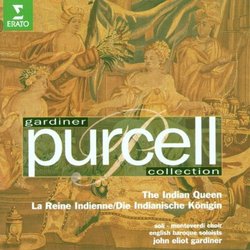| All Artists: Henry Purcell, John Eliot Gardiner, John Elwes, Gillian Fisher, Monteverdi Choir, English Baroque Soloists, Martin Hill, Nicholas Kraemer, Nona Liddell, Marilyn Sansom, Rosemary Hardy, Dinah Harris Title: Gardiner Purcell Collection - The Indian Queen Members Wishing: 0 Total Copies: 0 Label: Elektra / Wea Release Date: 5/2/1995 Genres: Pop, Classical Styles: Vocal Pop, Opera & Classical Vocal, Forms & Genres, Theatrical, Incidental & Program Music, Historical Periods, Baroque (c.1600-1750) Number of Discs: 1 SwapaCD Credits: 1 UPC: 745099655129 |
Search - Henry Purcell, John Eliot Gardiner, John Elwes :: Gardiner Purcell Collection - The Indian Queen
 | Henry Purcell, John Eliot Gardiner, John Elwes Gardiner Purcell Collection - The Indian Queen Genres: Pop, Classical
|
Larger Image |
CD Details |
CD ReviewsA vision that death will frustrate Jacques COULARDEAU | OLLIERGUES France | 08/05/2002 (5 out of 5 stars) "The final semi-opera by Purcell is certainly a work of great weight. First it gives us a vision of America that does not correspond at all to what it was in the English colonies at the time. We are going back to Aztecs and Incas before the conquest by Spain. These old civilizations are shown as being based and centered on love. Purcell uses the story (not the history) of King Montezuma to praise love and total dedication to the loved one, including death if necessary. At the very same time in New England colonies (Massachussetts particularly and its Salem witches) witches were burned by the dozen and in the southern colonies slaves were exploited to the most extreme limits of inhumanity. This vision of love as the guiding value of the world is extremely modern and goes beyond « The Fairy Queen » where it is in a way reduced to the necessity of faithful matrimony. And that is the second important element of this opera. The third one is musical. Purcell is a precursor in a way because the emphasis is set on the melody, the use of human voices to express feelings and emotions. For him, nearly everywhere in this opera singing is the center of the music. The music sings more than it plays. And this announces the eighteenth century and the precursors of the classical age, the transitory phase between Bach on one hand (for whom voices were instruments of their own) and Beethoven or Mozart. Voices are not plain musical instruments. They have their own dimension : they express emotions both with the music it uses and the words it makes sing, they make build a temple to human feelings and some social awareness. There is something primitive in this stand, in this music that grips you by the throat. It is poignant and carnal. It comes from our physical senses and not from out moral convictions. We have definitely overcome the Puritan period in England and we are entering the modern ages that will lead to development, progress, democracy, freedom. Purcell is in a way a prophet and his short life prevented him from giving the full value of his vision and art." Very nicely done, polished Purcell. Esther Criscuola | Oberlin, Ohio, USA | 10/29/1999 (4 out of 5 stars) "I'm a big fan of John Eliot Gardiner's Purcell interpretations, and I'm very glad to have this one in my collection. It's just gorgeous, very much in the spirit of Purcell. The only thing I could have wished for is including the spurious (?) epilogue, just for musicological interest, but it stands very nicely as it is."
|

 Track Listings (33) - Disc #1
Track Listings (33) - Disc #1